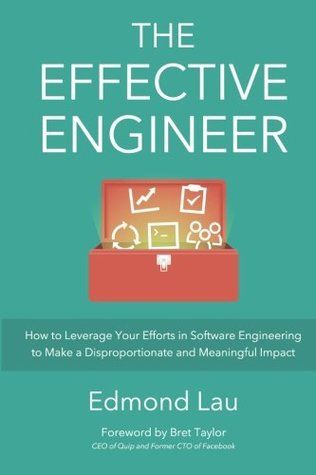The Effective Engineer by Edmond Lau
How to Leverage Your Efforts In Software Engineering to Make a Disproportionate Impact

The Effective Engineer is a book about Leverage; to be more specific, about maximizing your leverage - where leverage is defined as the impact produced per time invested. It is a book written by a Software Engineer for his fellow Software Engineers, to teach some of the soft skills necessary to be effective in our chosen profession.
I really enjoyed reading this book because it was written for me, by someone like me, and all the tips were relevant. It is not often that I pick up a book and every single thing in it is relevant. Of course, that may speak more to the way I cultivate a reading list than to how many books exist that can speak to me. In any case, as I said at the beginning, this book was about leverage, and how to maximize it.
Broken down by chapter, the book addressed the following topics:
- Focusing on High-Leverage Activities
- Optimizing for Learning
- Prioritizing Regularly
- Investing in Iteration Speed
- Measuring What You Want to Improve
- Validating Your Ideas Early & Often
- Improving Your Project Estimation Skills
- Balancing Quality with Pragmatism
- Minimizing Operational Burden
- Investing in Your Team's Growth
As you can see from the chapter headings, none of these tips had anything to do with coding, or programming per say, but rather, they were focused on how to make the most of your efforts at work. For example, if you follow chapter 5's advice and measure what you want t0 improve, then you will be able to track progress, know when you've hit milestones, and have a metric or metrics by which you can determine the success or failure of your efforts.
Of course if knowing, understanding, and implementing these ideas was as simple as reading the chapter headings, then there would've been no need for a whole book! The book goes further by elucidating each chapter heading with real world examples, costs and benefits to implementing and not implementing the tips, and suggestions for how to apply the tips in our day-to-day work as Engineers. This is what made the book so interesting to read... and all of this coming from an Engineer who has worked at Google and Quora with interviews from Engineers who worked at Facebook, Dropbox, Microsoft, and other big names. So you can be sure these tips are Industry Best Practices in case you had any doubts.
I gave the book a 5-star rating, but you know, that's because I'm right smack in the middle of its target audience. If you are not a Software Engineer and you read this book, while the tips do still apply, many of the examples will not. So I am not sure how interesting it would be to a non-S.E.
That said, if you are a Software Engineer, and any of those chapter headings above feels new to you, I would recommend grabbing a copy.